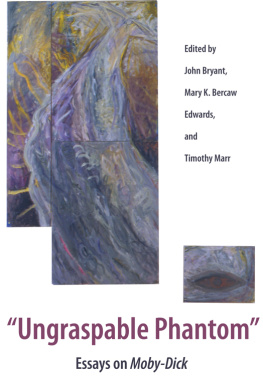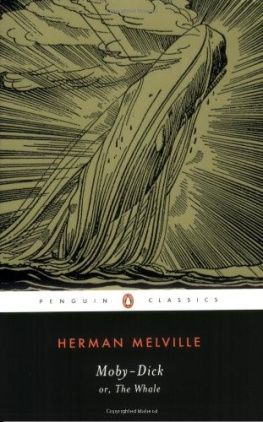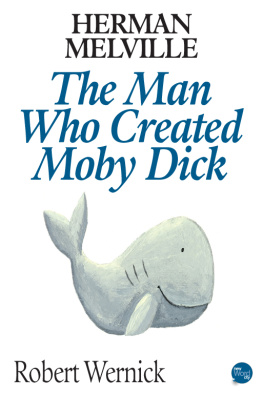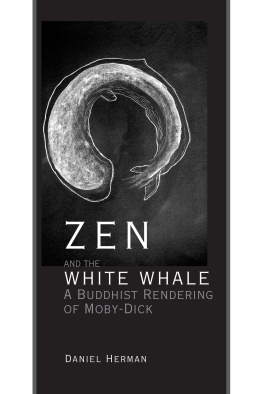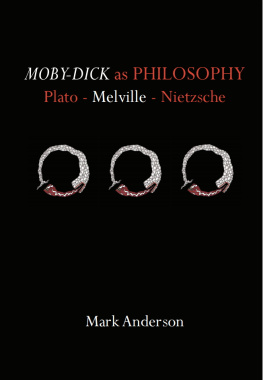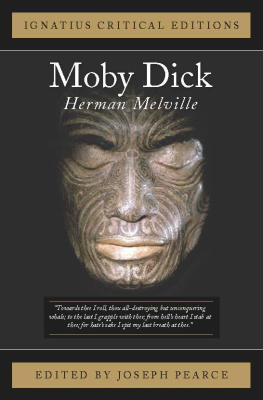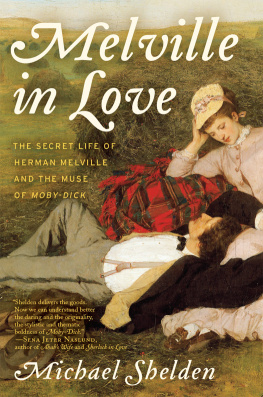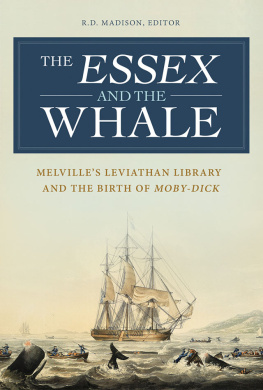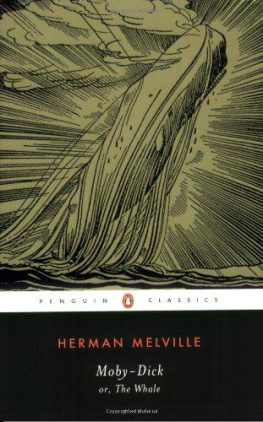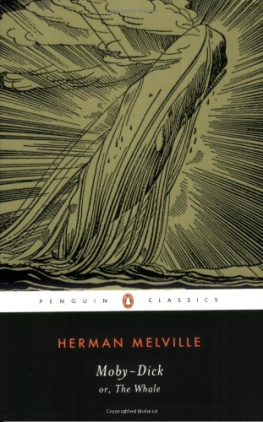Melville Herman - Ungraspable phantom: essays on Moby-Dick
Here you can read online Melville Herman - Ungraspable phantom: essays on Moby-Dick full text of the book (entire story) in english for free. Download pdf and epub, get meaning, cover and reviews about this ebook. City: Hempstead;NY;Kent;Ohio, year: 2006, publisher: The Kent State University Press, genre: Art. Description of the work, (preface) as well as reviews are available. Best literature library LitArk.com created for fans of good reading and offers a wide selection of genres:
Romance novel
Science fiction
Adventure
Detective
Science
History
Home and family
Prose
Art
Politics
Computer
Non-fiction
Religion
Business
Children
Humor
Choose a favorite category and find really read worthwhile books. Enjoy immersion in the world of imagination, feel the emotions of the characters or learn something new for yourself, make an fascinating discovery.
- Book:Ungraspable phantom: essays on Moby-Dick
- Author:
- Publisher:The Kent State University Press
- Genre:
- Year:2006
- City:Hempstead;NY;Kent;Ohio
- Rating:5 / 5
- Favourites:Add to favourites
- Your mark:
- 100
- 1
- 2
- 3
- 4
- 5
Ungraspable phantom: essays on Moby-Dick: summary, description and annotation
We offer to read an annotation, description, summary or preface (depends on what the author of the book "Ungraspable phantom: essays on Moby-Dick" wrote himself). If you haven't found the necessary information about the book — write in the comments, we will try to find it.
Ungraspable phantom: essays on Moby-Dick — read online for free the complete book (whole text) full work
Below is the text of the book, divided by pages. System saving the place of the last page read, allows you to conveniently read the book "Ungraspable phantom: essays on Moby-Dick" online for free, without having to search again every time where you left off. Put a bookmark, and you can go to the page where you finished reading at any time.
Font size:
Interval:
Bookmark:

Essays on Moby-Dick

EDITED BY
John Bryant,
Mary K. Bercaw Edwards,
and Timothy Marr
THE KENT STATE UNIVERSITY PRESS
KENT, OHIO
2006 by The Kent State University Press, Kent, Ohio 44242
ALL RIGHTS RESERVED
Library of Congress Catalog Card Number 2005034827
ISBN-10: 0-87338-860-7
ISBN-13: 978-0-87338-860-3
Manufactured in the United States of America
10 09 08 07 06 5 4 3 2 1
Composing Moby-Dick: What Might Have Happened: The Astman Distinguished Lecture is from The Creationists by E. L. Doctorow, 2006 by E. L. Doctorow.
Used by persmission of Random House, Inc.
LIBRARY OF CONGRESS CATALOGING-IN-PUBLICATION DATA
Ungraspable phantom : essays on Moby-Dick /
edited by John Bryant, Mary K. Bercaw Edwards, and Timothy Marr.
p. cm.
Consists of a selection of revised pages presented at the interdisciplinary conference,
Moby-Dick 2001, held Oct. 1820, 2001 at Hofstra University.
The conference was co-sponsored by the Melville Society.
Includes bibliographical references and index.
ISBN-13: 978-0-87338-860-3 (pbk. : alk. paper)
ISBN-10: 0-87338-860-7 (pbk. : alk. paper)
1. Melville, Herman, 18191891. Moby-DickCongresses. 2. Sea stories, American History and criticismCongresses. 3. Whaling in literatureCongresses. 4. Whales in literatureCongresses. I. Bryant, John, 1949 II. Edwards, Mary K. Bercaw. III. Marr, Timothy, 1960 IV. Melville Society.
PS2384.M6U65 2006
813.3dc22 2005034827
British Library Cataloging-in-Publication data are available.
Composing Moby-Dick: What Might Have Happened:
The Astman Distinguished Lecture
Ungainly Gambols and Circumnavigating the Truth:
Breaking the Narrative of Moby-Dick
Chiefly Known by His Rod:
The Book of Jonah, Mapples Sermon, and Scapegoating
Melville, Moby-Dick, and the Depressive Mind:
Queequeg, Starbuck, Stubb, and Flask as Symbolic Charaters
Deadly Voids and Unbidden Infidelities:
Death, Memory, and Law in Moby-Dick
I Stand Alone Here upon an Open Sea:
Starbuck and the Limits of Positive Law
In This Simple Savage Old Rules Would Not Apply:
Cetology and the Subject of Race in Moby-Dick
Kings of the Upside-Down World:
Challenging White Hegemony in Moby-Dick
Dreaming a Dream of Interracial Bonds:
From Hope Leslie to Moby-Dick
Theres another rendering now:
On Translating Moby-Dick into German
L ately, when thinking about Moby-Dickand having nothing else in particular to interest me on shore, I keep Melvilles novel in mind a great dealI find myself dwelling on the hug. I do not mean to suggest that the novel fills me with such exhilaration and warmth that it requires a strong moral principle to prevent me from deliberately embracing the first person I meet on the street. Of course, like many readersincluding artists, scholars, and criticsI love this book and readily admit to moments of stunned awe in reading passages in the book and to having shared them in classrooms, at home, and once or twice with strangers on the street; I have even participated in marathon readings of Moby-Dick along with other bleary-eyed companions, up all night reading their assigned chapters out loud, hopped up on Melvilles jazz. I will admit to having hugged a Melville reader in fellowship now and again. But, in fact, Moby-Dick is also a hard read, at times infuriating, frightening, indeed alienating; and the enthused, celebratory hug of mutual self-contentment you might expect me to offer in a preface like this to a book of essays celebrating the sesquicentennial of Moby-Dick is not at all the hug I am thinking of when I find myself thinking about Moby-Dick.
The hug I am thinking of is above all a physical act, which is not at all what one might think is central to a book that is so famously metaphysical, one that ventures beyond materiality. But, of course, the search for something spiritual, essential, ideal beyond our physical realmwhat Melville calls the ungraspable phantom of life, or more bravely and weirdly the extracted essence called spermoccurs within, not beyond. It happens very much here and now, mixed within the stuff of nature and in our contemplation of the dull thud we hear and feel as we continually find ourselves running up against the impenetrable and finally unknowable thing of existence. Melville always plays this out in the dramatic difference between the lyrical transcendence of Ishmael and the tragic frustration of Ahab. Think of Ishmaels comic vision expressed in his contrasting of two whale heads in Chapters 74 and 75: The Sperm Whale, with eyes on either side of its head, each taking in a separate image, has a mind that can subtilize those opposing views into one; the Right Whale with a lifeless lip pressed upon the deck seems, through Ishmaels poetic expansions, to speak of an enormous practical resolution in facing death (335). But also think of Ahab playing Hamlet in The Sphinx (ch. 70), contemplating the decapitated head of a whale hanging alongside the Pequod, leaning upon a cutting spade impaled in the whales cheek, soliloquizing: O head! thou hast seen enough to split the planets and make an infidel of Abraham, and not one syllable is thine (312). So many decapitated heads, so many blobs of flesh, once vessels of life, now inert and inanimate. Where is the spark that gave them animation? Where is the consciousness that rides that spark? What is this phantom of Being? Perhaps if we hug these blobs real hard, we can get an answer.
At the heart of Moby-Dick is a problem, and the problem is this: the essence of life is contained within the substance of life and cannot be extracted without killing life; full transcendence, therefore, is impossible. No wonder that a Sperm Whaledeep-diving, silently knowing, yet outrageously large, and therefore unhuggablebecame the apt symbol for both the material thing to grab at and the essential elusive thingness within that cannot be grabbed. The irony, then, is that the essential meaning of life is inseparable from the stuff of life, and yet no matter how close we hold this stuff to us, we get no closer to that essence. Thus, hugging, whether it be hugging oneself, another human, the shore, the inhuman sea, or some impossible whale, is a futile act. Which is why hugging figures so prominently in Melvilles book.
That Melville could take his symbol of a sperm whale, paint it white to raise the stakes and make his whale a terror signifying not death or evil but nothingness; that he could float this whale among men and other whales to raise the stakes yet again, and make it the focus of drama and meditation, tragedy and comedy; that he could fashion the conflicts around this whale to body forth flesh-and-blood ideas about sexuality, race, madness, democracy, death, and domesticity; that he could write in such a way as to give courageas playwright Tony Kushner has put itto other writers to think and write bravely and weirdly for themselves; that his writing has given me courage to write a hold-your-breath sentence like this; that Melville wrote so wildly well and continues to grab us is surely far more important than any image of a simple hug.
And yet the Melvillean hug is everywhere in Moby-Dick, in one form or another. It comes most often in association with Queequeg (earthy, silent, and profound; more centered than nervous Ishmael or sullen Ahab). In The Counterpane (ch. 4), Ishmael wakes up to find Queequegs tattooed arm over him in a wedding-like embrace: it was only by the sense of weight and pressure that I could tell that Queequeg was hugging me (25). And it is this hug that reminds Ishmael of an episode from his childhood when, forced to bed in midday as punishment for attempting to climb up the chimney, he dozes then wakes with the sensation of a supernatural hand placed in his. This phantom, as he calls it, holds him as if for ages; it is a version of the grand hooded phantom of Moby Dick and of the tormenting image that Narcissus saw and died trying to reach. Is it some essential thing from some other world, real but intangible, this phantom? Or is it a reflection of the self, equally real, but also (despite the intimacy of selfhood) equally intangible? It is, Ishmael concludes, the ungraspable phantom of life (5), and Melville wants us to know this ungraspableness in graspable ways.
Font size:
Interval:
Bookmark:
Similar books «Ungraspable phantom: essays on Moby-Dick»
Look at similar books to Ungraspable phantom: essays on Moby-Dick. We have selected literature similar in name and meaning in the hope of providing readers with more options to find new, interesting, not yet read works.
Discussion, reviews of the book Ungraspable phantom: essays on Moby-Dick and just readers' own opinions. Leave your comments, write what you think about the work, its meaning or the main characters. Specify what exactly you liked and what you didn't like, and why you think so.

